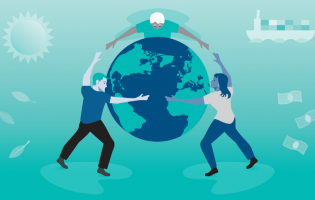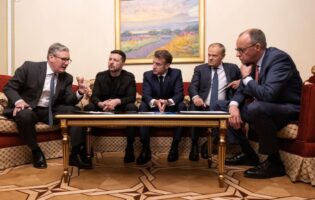A German-American Dialogue of the Next Generation
Society, Culture, and Politics Virtual Meeting
Participants of the Society, Culture & Politics Group came together for their second virtual meeting on February 13, 2018. The group addressed two main questions: Do civil society actors become more important in an American foreign policy of isolationism, or are they sidelined through defunding and delegitimization? In a strained relationship between the US and Germany, what role can civil society actors play to improve relations and reconcile differences, and which civil society actors can play such a role? Secondarily, can German and Israeli civil society entities cooperate to address international conflicts? Because of the different backgrounds of the experts, there was a healthy debate about recommendations, and therefore different perspectives added to their corresponding recommendations. There were divisions within the group as to the appropriate level of analysis – micro or macro – and the nature of potential outcomes -minimalist or maximalist. The group developed these recommendations that are scheduled to be presented at the final conference April 9-10, 2018.
A civil society actor is considered to be a community of citizens linked by common interests and collective activity. In response to the first question about the importance of civil society and its role in the current political climate in regards to US foreign policy, the group agreed that there is a difference between German and American civil society. Germans have more state funding, which gives them opportunities but makes them more reliant upon the state and its goals; whereas in the United States, there is more reliance on private funding, which could make it harder to accomplish goals that have little funding, but gives Americans more leeway to set their own goals. The group acknowledged that civil society has a greater role in the United States because of the isolationist rhetoric of the current administration, because those in civil society have ways of sort of circumventing the state and acting in a way that promotes transatlantic and global cooperation. For example, MIT has made initiatives to rebrand itself as a global partner that encourages exchange of ideas, data and people, which juxtaposes the current administration’s rhetoric. In short, because the United States civil society relies more on private funding for its goals, it plays a large role despite the isolationist position that the state has taken, according to this focus group.
In regards to the second question concerning the role of civil society in the world’s political arena, it depends on which aspect of civil society one is trying to engage. Groups that already have a vested interest in global cooperation (educational institutions, mass media, tech companies, etc.) have more of a voice and more opportunities to circumvent (and sometimes oppose) the state’s actions and stance. One recommendation was to encourage the involvement of churches in the United States and Germany to have a transatlantic dialogue and to promote the importance of the transatlantic relationship. Church networks have a way to reach people who aren’t as concerned with the transatlantic relationship, and there is already a precedent in Germany, where both Catholic and Protestant churches have extensive relationships with their counterparts elsewhere in Europe, so this recommendation has potential. Another suggestion was to convene transatlantic town halls to discuss the challenges to democracy. Mindful of some fundamental differences, collective groups could also focus on basic questions of identity (colonialism, slavery, the Holocaust; populism, demographic change).
Educational institutions can also play a role in maintaining and improving our bilateral relationship with Germany, suggested an expert in the group. Studying abroad for the sake of studying abroad is not as effective in promoting a bilateral relationship, but if there is an actual goal that exchange students have to work towards while studying abroad, that is more positive. The group recommended exchange programs focused on a common goal such as research topics relating to STEM or global issues (minority rights, social justice, new energy, the environment), service learning or mission work, where students can see the value or a cross-cultural dialogue. Such exchanges could involve digital communication and virtual encounters
This discussion led to the question of the importance of a transatlantic relationship and why we need one. When states can’t deliver on sharing this importance, it is hard for civil society to deliver. There should not be a transatlantic relationship for the sake of having a transatlantic relationship–there are areas (digitalization, AI, technology, and environmental issues, to name a few) that touch everyone globally, and this relationship promotes advances in those areas. Therefore, this group recommends, organizations should encourage the next generation to become more interested in this relationship, which would help maintain it. In an ideal world, there would be more funding for programs that encourage collaborative programs transatlantically, which target youth and future leaders as well as disadvantaged or under-represented groups who don’t yet have these opportunities. Organizations (especially educational and technical institutions) can make focus groups with young people from Germany and the United States where they come together and collaborate on a theme with common interest and a common goal (AI, for example), where they can focus on something positive and recognize the importance of maintaining a relationship with one another.
Another suggestion made by some members of this group was to start an international campaign to promote shared “western” values (democracy, human rights, personal freedom, etc.) between the United States and Germany and to help both sides understand what the other side feels about the German-American relationship. This could include monitoring/tracking (polls?) that measure how Germans and Americans feel about the transatlantic relationship and which age groups feel a certain way. From there, there can be a series of events or focus groups such as the ones previously mentioned (perhaps groups of university students) who focus on a common goal or issue between the United States and Germany. This can continue for a period of time, after which more monitoring/tracking can be done to see if these events or focus groups have had any positive impact on the way that Germans and Americans view the transatlantic relationship.
One final recommendation was to have state-funded political foundations, such as the International Republican Institute and the National Democratic Institute in the United States, and the Heinrich Böll Foundation (die Grünen), Friedrich Naumann Foundation (FDP), Friedrich Ebert Foundation (SPD) and the Konrad Adenauer Foundation (CDU) in Germany promote civil society exchanges. Although all four mentioned German political foundations have offices in Washington, DC, neither the International Republican Institute nor the National Democratic Institute have offices in Germany. If there were offices in Berlin, it might be easier to have transatlantic dialogue between the foundations that encourage a relationship between the two states and collaborative work in the international arena.
Although some of these recommendations may be idealistic, it is important to recognize the importance of having a transatlantic relationship for what it can concretely offer, and not just having a relationship for the sake of it. There are several areas where collaboration is key, and where civil society organizations can fill in the gaps that the state is leaving with its isolationist view. This group put an emphasis on educating younger generations about the importance of this relationship, which seems to have diminished in the generation currently in power. Isolationism is becoming less and less of an option, especially in today’s world of global technology, and embracing the transatlantic relationship could help both parties excel in the future.
Regarding the international arena, reference was made to German and American churches and peace groups coming together to challenge policies that include a pre-emptive strike against North Korea and to promote diplomatic outcomes.
On the Israel-Palestine conflict, autonomous German and American civil society actors, not dependent on governments, could help find a “third way” beyond extremism on both sides by engaging civil society networks in the region.






